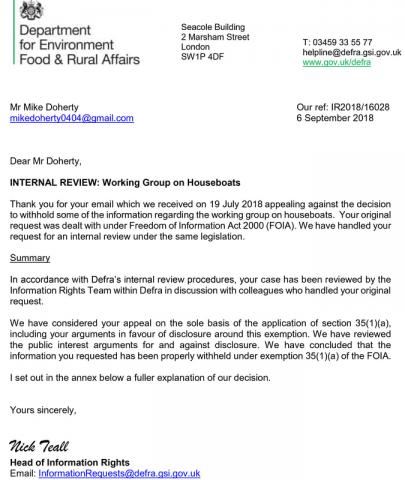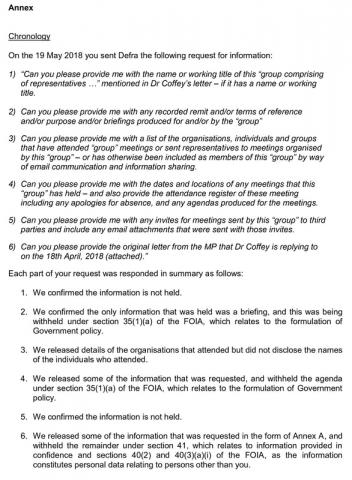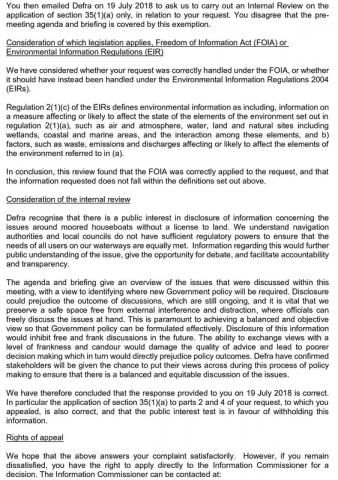DEFRA keeps secrets of working group hidden – so boaters fear law change
September 2018 - It seems the government is very determined to keep under wraps exactly what the new working party set up by Defra minister Dr Thérèse Coffey to look at 'boats used as accommodation' is designed to achieve – leading to experienced observers to become even more convinced that changes to the 1995 British Waterways Act - particularly the 14-day rule and the section allowing boats to be licensed with no home mooring - was on the agenda for discussion and in the briefing, as Peter Underwood reports.
Now government is refusing to tell anyone what is going on with a Freedom of Information request refused and Defra still rejecting an attempt by an experienced boater to appeal that refusal – claiming civil servants and navigation authorities need to be able to discuss the issues “preserve a safe space free from external interference and distraction”
Their persistent secrecy on matters that Defra admits have significant public interest is about to be challenged again with an appeal to the Information Commissioners Office. However, Defra, Canal & River Trust and the Environment Agency will have gained nearly a year of freedom to talk about the future of the waterways in secret before that appeal is decided.
Back in May, The Floater reported that a leaked letter from a junior Tory minister with responsibility for waterways at the Department for Environment, Food and Rural Affairs, showed that she has set up a group ear;lier in the year to, 'find appropriate solutions that balance the needs of waterway users against those who chose to live on our inland waterways'
The letter from Thérèse Coffey to an East London MP demonstrated that Defra had set up a 'group' that includes local councils, the Environment Agency and Canal & River Trust – but excluded all boating organisations.
It's aims seemed to be fairly clear – Defra seems to see people living on their boats as a problem and wants to find 'solutions' and that led London boaters, in particular, to believe the key part of the 1995 Act may be up for amendment or abandonment.
Coffey’s letter said: “The responsibility for individual waterways sits with the respective navigation authority. I am aware, however, that the rise in the numbers of houseboats is an issue for all navigation authorities as more people chose to make houseboats along our waterways their homes.
“The group's remit is to serve as a platform for discussions to take place on a number of issues around moored houseboats. Although these discussions are in an early stage, I can reassure your constituent that there is a clear wish amongst the members of the group to find appropriate solutions that balance the needs of waterway users against those who chose to live on our inland waterways”
The Floater asked Defra what was going on, to be told: “The working group was set up in response to concerns raised by several MPs and waterway users around a number of boats being used as rented accommodation on the River Thames - moored to publicly accessible land without the landowner’s permission.
“These concerns, alongside an increased use of waterways for residential purposes, led to a commitment to form a group consisting initially of the main navigation authorities and other groups such as the Ministry of Housing, Communities and Local Government.
“The purpose of this group is to provide a platform to discuss experiences and differing perspectives of the issues.
“At the initial meeting held in December 2017, it was agreed that user groups could be invited to help with the group’s work and the terms of reference for the group are now being determined.”
At the same time Mike Doherty of London Boaters put in a Freedom of Information request to Defra asking for the name or working title of this “group comprising of representatives ...” and its remit and terms of reference as well as any briefings produced for or by the group.
He also wanted to know what organisations, individuals and groups attended the meetings, where and when meetings and any agendas produced for the meetings.
Defra said it didn’t have a name for the group and that it was withholding information about the briefing under section 35(1)(a) of the FOIA, which relates to the formulation of Government policy.
Significantly it even withheld the agenda – under the same get out clause – something that leads observers to conclude that the 1995 Act was almost certainly on that agenda.
Mike challenged the decision, requesting an internal review and that has resulted in Defra digging it’s heels in and keeping all details secret from boaters and even official boating groups, none of whom, were invited to the Defra talks.
Defra said: “Defra recognise that there is a public interest in disclosure of information concerning the issues around moored houseboats without a license to land.
“The agenda and briefing give an overview of the issues that were discussed within this meeting, with a view to identifying where new Government policy will be required.
“Disclosure could prejudice the outcome of discussions, which are still ongoing, and it is vital that we preserve a safe space free from external interference and distraction, where officials can freely discuss the issues at hand.
“This is paramount to achieving a balanced and objective view so that Government policy can be formulated effectively. Disclosure of this information would inhibit free and frank discussions in the future. The ability to exchange views with a level of frankness and candour would damage the quality of advice and lead to poorer decision making which in turn would directly prejudice policy outcomes.
“Defra have confirmed stakeholders will be given the chance to put their views across during this process of policy making to ensure that there is a balanced and equitable discussion of the issues.
“We have therefore concluded that the response provided to you on 19 July 2018 is correct.”
Slamming the door in the face of all boaters has not gone down well. As one boater pointed out: “Defra acknowledges that there will be a need to seek opinions of other stakeholders outside of the 'group' but only once the 'group' has basically decided on a course of action(s)..so how exactly do they intend to garner a balanced understanding of the issues at hand if there is no representative boating body included in the pre-public 'group' discussions?
“Also the line 'Free from external interference and distraction...paramount to achieving..an objective view' is particularly worrying as:
a) this isn't a bloody court case, it's a review, and
b) there is nothing objective if most/all of the involved 'group' parties view boaters as a nuisance/problem.
“To then go on to state that frankness and candour are not wanted due to 'prejudicing' policy outcomes...beggars belief”
Given this level of secrecy it has hardly surprising that many boaters suspect Defra civil servants, along with those from the Environment Agency and the directors and trustees of Canal & River Trust are planning some nasty surprises for them behind closed doors.
Photos: (1st) The letter rejecting Mike's appeal, (2nd) The questions and Defra's response, (3rd) The excuses for rejecting the appeal.








